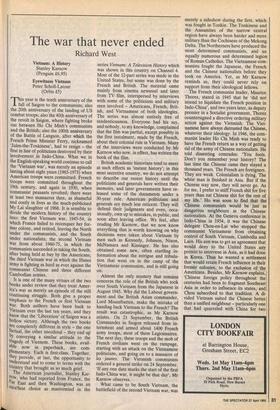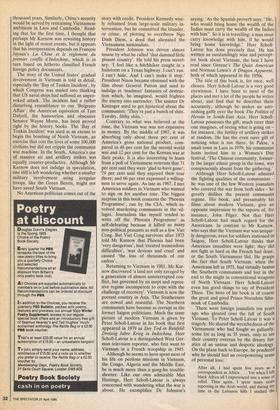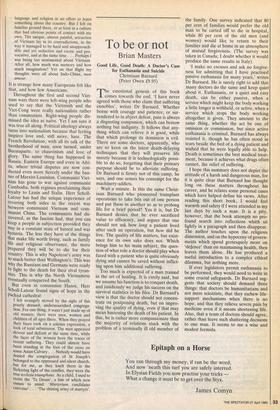The war that never ended
Richard West
Vietnam: A History Stanley Karnow (Penguin £6.95) Eyewitness Vietnam Peter Scholl-Latour (Orbis £5) rr his year is the tenth anniversary of the I fall of Saigon to the communists; also the 20th anniversary of the landing of US combat troops; also the 40th anniversary of the revolt in Saigon, where fighting broke out between Ho Chi Minh's communists and the British; also the 100th anniversary of the Battle of Langson, after which the French Prime Minister Ferry, nicknamed `Jules-the-Tonkinese', had to resign — the first in line of politicians destroyed by their involvement in Indo-China. What we in the English-speaking world continue to call the 'Vietnam war', was merely an episode lasting about eight years (1965-1973) when American troops were committed. French troops were committed throughout the 19th century, and again in 1930, when communist peasants revolted; there were at least two massacres then, as shameful and costly in lives as the much-publicised My Lai slaughter of 1968. It is sensible to divide the modern history of the country into: the first Vietnam war, 1945-54, in which France failed to reconquer her for- mer colony, and retired, leaving the North under the communists, and the South under nationalists; the second Vietnam war from about 1960-75, in which the communists succeeded in taking the South, after being held at bay by the Americans; the third Vietnam war in which the Hanoi army is fighting as hard as ever against the communist Chinese and three different Cambodian armies.
It is one of the many virtues of the two books under review that they treat Amer- ica's war as merely an episode of the still continuing struggle. Both give a proper emphasis to the French or first Vietnam war. Both authors have been back to Vietnam over the last ten years, and they know that the 'Liberation' of Saigon was a hollow victory. Although the two books are completely different in style — the one factual, the other anecdotal — they end up by conveying a similar attitude to the tragedy of Vietnam. These books, avail- able now in paperback, are com- plementary. Each is first-class. Together, they provide, at last, the opportunity to understand and to come to terms with the country that brought us so much grief. The American journalist, Stanley Kar- unw, who had reported from France, the 'Par East and then Washington, was an excellent choice as mastermind in the
series Vietnam: A Television History which was shown in this country on Channel 4.
Most of the 12-part series was made in the United States, but some was done by the French and British. The material came mainly from cinema newsreel and later from TV film, interspersed by interviews with some of the politicians and military men involved — Americans, French, Brit- ish, and Vietnamese of both ideologies. The series was almost entirely free of tendentiousness. Everyone had his say, and nobody, to my knowledge, complained that the film was partial, except possibly in the first instalment, made by the French, about their colonial rule in Vietnam. Many of the interviews were conducted by Mr Karnow who now, in effect, has written the book of the film.
British academic historians tend to sneer at such efforts as 'instant history'; in this most secretive country, we do not attempt to describe our recent history until the politicians and generals have written their memoirs, and later governments have re- leased some of the documents under a 30-year rule. American politicians and generals are much less reticent. They will defend their judgments and even, occa- sionally, own up to mistakes, in public, and soon after leaving office. We feel, after reading Mr Karnow, that we now know everything that is worth knowing on why decisions were taken about Vietnam by men such as Kennedy, Johnson, Nixon, McNamara and Kissinger. He has also obtained some new, often startling in- formation about the intrigue and tribula- tion that went on in the camp of the Vietnamese communists, and is still going on.
Almost the only mystery that remains concerns the role of the British who took over South Vietnam from the Japanese in August 1945. Why did the Labour govern- ment and the British Asian commander, Lord Mountbatten, make the mistake of handing back Vietnam to the French? The result was catastrophic, as Mr Karnow relates. On 21 September, the British Commander in Saigon released from in- ternment and armed about 1400 French army troops, most of them Legionnaires. The next day, these troops and the mob of French civilians went on the rampage, starting with an attack on the Vietnamese politicians, and going on to a massacre of les jaunes. The Vietminh communists ordered a general strike on 24 September. 'If any one date marks the start of the first Indo-China war, it might be that day', Mr Karnow observes.
What came to be South Vietnam, the battlefield of the second Vietnam war, was merely a sideshow during the first, which was fought in Tonkin. The Tonkinese and the Annamites of the narrow central region have always been harder and more military than the Cochinese of the Mekong Delta. The Northerners have produced the most determined communists, and an equally numerous and determined legion of Roman Catholics. The Vietnamese com- munists fought the Japanese, the French and the Chinese nationalists before they took on America. Yet, as Mr Karnow reminds us, they could never rely on support from their ideological fellows.
The French communist leader, Maurice Thorez, stated in 1945 that he 'did not intend to liquidate the French position in Indo-China', and two years later, as deputy premier in a Socialist government, Thorez countersigned a directive ordering military action against the Vietminh. The Viet- namese have always distrusted the Chinese, whatever their ideology. In 1946, the com- munist leader Ho Chi Minh was ready to have the French return as a way of getting rid of the army of Chinese nationalists. He told dissenting comrades: 'You fools. Don't you remember your history? The last time the Chinese came they stayed a thousand years. The French are foreigners. They are weak. Colonialism is dying. The 'white man is finished in Asia. But if the Chinese stay now, they will never go. As for me, I prefer to sniff French shit for five years than eat Chinese shit for the rest of my life.' Ho was soon to find that the 'Chinese communists would be just as dangerous neighbours as the Chinese nationalists. At the Geneva conference in Indo-China in 1954, it was the Chinese delegate Chou-en-Lai who stopped the communist Vietnamese from obtaining control of South Vietnam, Cambodia and Laos. His aim was to get an agreement that would deny to the United States any pretext to intervene in Asia, as it had done in Korea. Thus he wanted a settlement that would retain French influence in their former colonies, to the exclusion of the Americans. Besides, Mr Karnow explains, `Chinese foreign policy throughout the centuries had been to fragment Southeast Asia in order to influence its states, and Chou subscribed to that tradition. A di- vided Vietnam suited the Chinese better than a unified neighbour — particularly one that had quarreled with China for two thousand years. Similarly, China's security would be served by restraining Vietnamese ambitions in Laos and Cambodia.' Read- ing that for the first time, I thought that perhaps Mr Karnow was rewriting history in the light of recent events, but it appears that his interpretation depends on Francois Jayaux's La Chine et le reglement du premier conflit d'Indochine, which is in turn based on hitherto classified French foreign policy documents.
The story of the United States' gradual involvement in Vietnam is told in detail, especially the `Bay of Tonkin Incident', by which Congress was misled into thinking that US naval ships had suffered an unpro- voked attack. The incident had a rather disturbing resemblance to our `Belgrano Affair'; the American equivalent of Tam Dalyell, the humourless and obsessive Senator Wayne Morse, has been proved right by the history books. The `Bay of Tonkin Incident' was used as an excuse to begin the bombing of North Vietnam, an exercise that cost the lives of some 100,000 civilians but did not cripple the communist war machine. In the South, America's use of massive air and artillery strikes was equally counter-productive. Although Mr Karnow does not indulge in speculation, one still is left wondering whether a smaller military involvement using irregular troops, like the Green Berets, might not have saved South Vietnam.
No American politician comes out of the story with credit. President Kennedy wise- ly refrained from large-scale military in- tervention, but he committed the blunder, or crime, of plotting to overthrow Ngo Dinh Diem, a deed that alienated the Vietnamese nationalists.
President Johnson was driven almost insane by what he called `that damned little pissant country'. He told his press secret- ary: 'I feel like a hitchhiker caught in a hailstorm on a Texan highway. I can't run. I can't hide. And I can't make it stop.' President Nixon became obsessed with the film about General Patton and used to indulge in 'madman' fantasies of destruc- tion which, he imagined, would frighten the enemy into surrender. The sinister Dr Kissinger used to get hysterical about the communists: 'They're just a bunch of shits. Tawdry, filthy shits.'
Contrary to what was believed at the time, the Vietnam war was not expensive in money. By the middle of 1967, it was absorbing only about three per cent of America's gross national product, com- pared to 48 per cent for the second world war and 12 per cent for the Korean war at their peaks. It is also interesting to learn from a poll of Vietnamese veterans that 71 per cent said they were 'glad to have gone'; '74 per cent said they enjoyed their tour there; and 66 per cent expressed a willing- ness to serve again. As late as 1967, I met, American soldiers in Vietnam who wanted to sign on for another tour. The biggest surprise in this book concerns the 'Phoenix Programme', run by the CIA, which in- volved murdering communists in the vil- lages. Journalists like myself tended to write off the 'Phoenix Programme' as self-defeating because it killed so many non-political peasants as well as a few Viet Cong. But Viet Cong survivors after 1975 told Mr Karnow that Phoenix had been `very dangerous', had 'created tremendous difficulties', 'was devious and cruel' and caused 'the loss of thousands of our cadres'.
Returning to Vietnam in 1981, Mr Kar- now discovered 'a land not only ravaged by a generation of almost uninterrupted con- flict, but governed by an inept and repres- sive regime incompetent to cope with the challenge of recovery'. Vietnam is now the poorest country in Asia. The Southerners are cowed and resentful. The Northern communists have become as corrupt as the former Saigon politicians. Much the same picture of modern Vietnam is given by Peter Scholl-Latour in his book that first appeared in 1979 as Der Tod in Reisfeld: Dreissig Jahre Krieg in Indochina. Herr Scholl-Latour is a distinguished West Ger- man television reporter, who first went to Vietnam in a French troopship in 1945.
Although he seems to have spent most of his life on perilous missions in Vietnam, the Congo, Algeria and the Middle East, he is much more than a gung-ho trouble- shooter. Like our ovn admirable Max Hastings, Herr Scholl-Latour is always concerned with wondering what the war is about. He exemplifies Dr Johnson's saying: 'As the Spanish proverb says: "He, who would bring home the wealth of the Indies must carry the wealth of the Indies with him". So it is in travelling: a man must carry knowledge with him, if he would bring home knowledge.' Herr Scholl- Latour has done precisely that. He has written an outstandingly wise and percept- ive book about Vietnam, the best I have read since Greene's The Quiet American and Norman Lewis's A Dragon Apparent, both of which appeared in the 1950s.
The title of this book is, for once, well chosen. Herr Scholl-Latour is a very good eyewitness. I have been to most of the places and met a lot of the people he writes about, and find that he describes them accurately, although he makes an asto- nishing gaffe over the book The Politics of Heroin in South-East Asia. Herr Scholl- Latour possesses the gift, much rarer than one imagines, of seeing what is going on for instance, the futility of artillery strikes at random. He has the even rarer gift of noticing what is not there. In Pakse, a small town in Laos in 1979, his communist hosts invited him to a Women's Day festival. 'The Chinese community, former- ly the larger ethnic group in the town, was conspicuously absent from the gathering.'
Although Herr Scholl-Latour admired the fighting qualities of the communists — he was one of the few Western jounalists who covered the war from both sides — he greatly dislikes the present communist regime. His book, and presumably his films about modern Vietnam, give an opposite impression to the reports of, for instance, John Pilger. Not that Herr Scholl-Latour had much regard for the Americans. In contrast to Mr Karnow, who says that the Vietnam war was unique- ly dangerous, even for soldiers stationed in Saigon, Herr Scholl-Latour thinks that American casualties were light; they did not fight as hard as the French had done, or the South Vietnamese 'did. He grasps the fact that South Vietnam, when the Americans left in 1973, had virtually beaten the Southern communists and lost in the end to the might in conventional weapons of North Vietnam. Herr Scholl-Latour even has good things to say of President Thieu. The hero of his book is of course the great and good Prince Norodom Siha- nouk of Cambodia.
There were foreign jounalists ten years ago who gloated over the fall of South Vietnam. To Peter Scholl-Latour it was a
tragedy. He shared the wretchedness of the Vietnamese who had fought so gallantly,
some for as long as 35 years, only to see
their country overrun by the dreary fan- atics of an untrue and despotic ideology.
On the plane back to Europe, he pondered why he should feel an overpowering sense of personal loss:
After all, I had spent five years as 3 correspondent in Africa . . , Yet when I left black Africa all I experienced was a sense of relief. Then again, I spent many years reporting in the Arab world, and during my time in the Lebanon hills I studied the
language and religion in an effort to learn something about the country. But I felt on familiar ground there, or at least in a culture that had obvious points of contact with my own. The unique, almost painful, attraction of Vietnam lay in its contradictions, in the way it managed to be hard and unapproach- able and yet seductive and exotic and pro- vocative, and at the same time . . . Perhaps I was being too sentimental about Vietnam. After all, how much was memory and how much imagination? Yet on that flight my thoughts were all about Indo-China, mon amour.
It is strange how many Europeans felt like that, and how few Americans.
Throughout the first and second Viet- nam wars there were left-wing people who used to say that the Vietminh and the Viet-Cong were really nationalists rather than communists. Right-wing people dis- missed the idea as naive. Yet I am sure it was true all along. Political ideology always turns into nationalism because that feeling inspires love and, still more, hate. The French Revolution, with all its talk of the brotherhood of man, soon turned, under Buonaparte, to chauvinism and love of glory. The same thing has happened in Russia, Eastern Europe and even in Afri- ca, where trivial disputes are now con- ducted even more fiercely under the ban- ner of Marxist-Leninism. Communist Viet- nam has gone to war against communist Cambodia, both regimes proclaiming their loyalty to Lenin and Stalin. Herr Scholl- Latour has had the unique experience of covering both sides in the recent war between communist Vietnam and com- munist China. The communists had dis- covered, as the fascists had, that you can keep a people in subjection provided they stay in a constant state of hatred and war hysteria. The less they have of the things that make life worth living, such as family life and religious observance, the more prepared they will be to die for their country. This is why Napoleon's army was so much better than Wellington's. This was why the Russians and Germans were ready to fight to the death for their rival tyran- nies. This is why the North Vietnamese eventually conquered the South.
But even in communist Hanoi, Herr Scholl-Latour found signs of hope in the Packed cathedral:
I felt strangely moved by the sight of this poorly dressed, undernourished congrega- tion. For one thing, it wasn't just made up of old women; there were men, women and children of all ages there. When they prayed their faces took on a solemn expression, a look of total submission. The men appeared devout and defiant at the same time, while the faces of the women bore the traces of recent suffering. They could almost have been standing at the foot of the cross on
some Asian Calvary . . . Nobody would have denied the congregation of St Joseph's belonged to the oppressed and silent church, but for me, as they knelt there in the flickering light of the candles, they were the true ecclesia triumphans. As a child, I used to recite the 'Te Deum', a line of which now comes to mind: 'Martyrium candidatus xercitus' . . 'The shining army of martyrs'.




















































 Previous page
Previous page